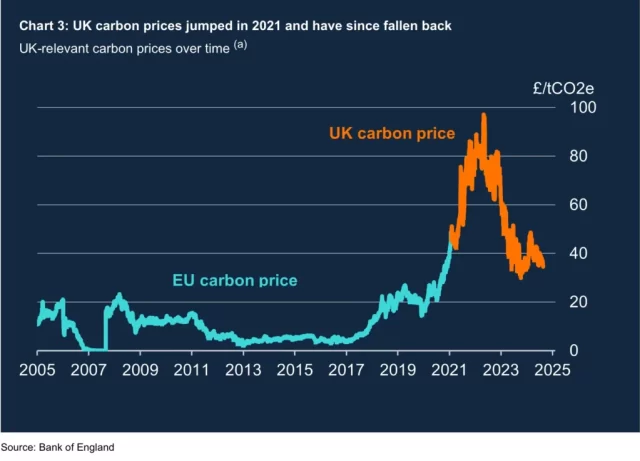The Telegraph reports:
Net zero policies are sharply driving up energy costs, the Bank of England has admitted, as officials battle to bring living costs back under control.
Sarah Breeden, the Bank’s deputy governor, said households and businesses were paying more for energy because of so-called carbon permits, which require power plants to pay for each tonne of carbon dioxide they emit.
These permits accounted for nearly half the cost of fuel bought by gas-fired power plants last year, Ms Breeden said, which was passed on to consumers.
Net zero policies are sharply driving up energy costs, the Bank of England has admitted, as officials battle to bring living costs back under control.
Sarah Breeden, the Bank’s deputy governor, said households and businesses were paying more for energy because of so-called carbon permits, which require power plants to pay for each tonne of carbon dioxide they emit.
These permits accounted for nearly half the cost of fuel bought by gas-fired power plants last year, Ms Breeden said, which was passed on to consumers.
“There is now evidence that policies aimed at the climate transition were probably more important contributors to the recent rise and fall in inflation than we previously thought,” the deputy governor said in a speech at the University of Edinburgh Business School.
It comes after Rachel Reeves, the Chancellor, told the Bank of England it had to take climate change as seriously as growth.
Ms Breeden’s comments underline the potential for a clash in mandates as net zero policies such as carbon pricing risk driving up living costs, when the Monetary Policy Committee’s main goal is to keep inflation at 2pc.
The deputy governor said carbon prices doubled to around £100 per tonne of CO2 between 2021 and the peak in 2022 as the Government cut back the supply of permits and applied the scheme to more industries.
Although the cost of permits has fallen back since then to around £40 per tonne, according to Bank of England data, that is roughly twice the 2019 level.
Ms Breeden added: “In 2022, during the peak of energy price shock, the wholesale price of gas was the dominant driver of high electricity prices. In 2024, however, carbon costs which amounted to roughly 50pc of the fuel costs for gas-fired electricity producers in the UK were a major driver of prices.
“Overall, we might expect close to 100pc of carbon costs naturally to be passed on in wholesale market prices.”
Critically for future price rises, the deputy governor said that regulatory costs such as permits appeared to have a bigger impact on inflation than other shocks in the market.
She said: “If energy prices rise due to a carbon permit supply shock, the impact on non-energy price inflation could be about one-and-a-half-times as large at its peak – and last several months longer – than if the rise were driven by a gas supply shock.
“That seems plausible if shocks of this kind are expected to be longer-lasting given the stringency and scope of the carbon permits scheme might be expected to increase over time.”
Editor:
And we wonder why we have the highest Electricity Prices in Europe if not the World.
Source Telegraph –





